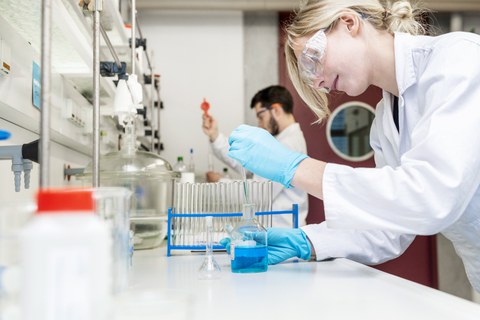Mar 30, 2023
Children’s labs as training facilities for teachers – approximately EUR 3.2 million for large-scale project conducted by eight universities
In a practical setting, topics in science, technology, engineering and mathematics (STEM) have a lot to offer. Demonstrative experiments, interesting methods and impressive findings are all possible in the laboratory. Children’s labs also promote school pupils’ motivation to pursue STEM subjects and work practices. But the potential that these labs offer for advanced teacher training (abbreviated LFB in German for Lehrkräftefortbildung) has not previously been exploited. With the participation of TU Dresden, the new “LFB-Labs-digital” joint project seeks to change this.
The project enhances children’s labs focused on STEM subjects, extending them into places of advanced teacher training. The main emphasis is on equipping teachers with digital skills. The researchers seek to garner greater benefit from professional development courses in the STEM areas in the digital world than ever before. Eight universities are working on the project together. Starting in April 2023, the Federal Ministry of Education and Research (BMBF) is providing the project group with approximately EUR 3.2 million in funding.
The key focus of the project’s members is on the quality management of the professional development courses on offer. Prof. Rolf Koerber from TU Dresden’s Institute of Vocational Education and Vocational Didactics is an expert in this area and represents TUD in the “Educational Services” DIN standards committee. “For advanced teacher training, it is becoming increasingly important to go beyond describing quality, insofar that we also establish suitable measures to guarantee it. A quality management system – in the best-case scenario, this would be a certification – is an excellent instrument that we want to develop and support in the pilot project,” Koerber explains.
Labs have made productive use of digital change
The plan is to tap into the existing children’s labs at the participating universities when conducting professional development courses for teachers in using digital tools. In all of Germany’s federal states, there are facilities for the research-based quality development of STEM-oriented instruction, advanced training and continuing education of teachers. The goal is to support these institutions by expanding on children’s labs in cooperation with the Federal STEM Competence Center.
“Children’s labs offer two advantages for advanced teacher training,” says Prof. Matthias Wilde, Professor of Didactics in Biology at Bielefeld University since 2005. “The tangible motivation for pursuing STEM topics and the associated work practices are great in labs such as these. Moreover, these labs were able to meet the challenges of the digital transformation more quickly and productively than formal places of education.”
LFB-Labs-digital compiles catalog of criteria for quality assessment
The new project is developing methods for incorporating children’s labs into advanced teacher training. These examples of good practice will serve as the basis for a catalog of criteria for scientifically assessing these methods. The project expands on the digital infrastructure in professional development courses for teachers with children’s labs. In the on-site labs, future teachers are shown what options exist for enriching their lessons using various digital tools. “We would like to work together with teachers to explore how they can use digital tools didactically and meaningfully in their lessons. These tools could include interactive video tutorials, simulations of molecular dynamics, and digital learning platforms,” says Prof. Stefanie Schwedler, Chemistry Education Specialist from Bielefeld. Studies are planned to ensure that teacher qualification measures in the digital world are effective.
About LFB-Labs-digital
LFB-Labs-digital is a shortened version of “Schülerlabore als Ort der Lehrkräftefortbildung in der digitalen Welt” – in English “Children’s labs as a place of advanced teacher training in the digital world.” The project began on April 1, 2023, and will run until September 30, 2025. It has received about EUR 3.2 million in funding from the Federal Ministry of Education and Research.
Contact:
Prof. Rolf Koerber
Technische Universität Dresden
Faculty of Education
Institute of Vocational Education and Vocational Didactics
Tel.: +49 351 463-42333
Prof. Stefanie Schwedler
Bielefeld University
Faculty of Chemistry
Tel.: +49 521 106-2038

